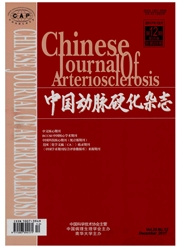

 中文摘要:
中文摘要:
调查 Xuezhikang 的短期、长期的效果的目的(, XZK ) , cholestin 的一篇摘录,(PCSK9 ) 在 proprotein convertase subtilisin/kexin 类型上, 9 铺平。方法三十只老鼠随机被划分成三个组并且被给盐, XZK 1,200 mg/kg 或 lovastatin 10 mg/kg 分别地由为 3 天(为各个的 n=10 ) 的每日的 gavage。没有为 dyslipidemia 的以前的类脂化合物阴沉的药治疗的十六个病人每天收到了 XZK 1,200 mg 8 个星期。Fasting 血样品和肝织物在为老鼠的白天 3 点被收集,当血样品在基线和星期被获得时 8 从病人。浆液 PCSK9 和类脂化合物侧面被测量。肝的低密度脂蛋白(LDL ) 的表示受体和甾醇(SREBP-2 ) 规章的元素绑定蛋白质 2 被真实 time-PCR 测量。在老鼠的结果 PCSK9 层次显著地在白天 3 点在 XZK 和 lovastatin 组(P=0.002, P=0.003 对控制) 被增加,当没有重要差别在类脂化合物参数的层次被发现时。在 34% 增加的病人(P=0.006 对基线) 的 PCSK9 层次由全部的胆固醇伴随了, LDL 胆固醇由 22% 和 28% P=0.001, P=0.002 对基线减少了) 。LDL 受体和 SREBP-2 的肝的 mRNA 层次显著地在 XZK 和 lovastatin 组被增加。结论 XZK 在老鼠和人以一种短期、长期的方式在 PCSK9 上有重要影响。而且,数据显示作为 lovastatin, XZK 通过 SREBP-2 增加了 PCSK9 层次小径。
 英文摘要:
英文摘要:
Objective:To investigate the short- and long-term effects of Xuezhikang(血脂康,XZK),an extract of Cholestin,on proprotein convertase subtilisin/kexin type 9(PCSK9) level.Methods:Thirty rats were randomly divided into three groups and were given saline,XZK 1,200 mg/kg or lovastatin 10 mg/kg respectively by daily gavage for 3 days(n=10 for each).Sixteen patients without previous iipid-lowering drug treatment for dyslipidemia received XZK 1,200 mg daily for 8 weeks.Fasting blood samples and liver tissue were collected at day 3 for rats,while the blood samples were obtained at baseline and week 8 from patients.The serum PCSK9 and lipid profile were measured.The expression of hepatic low density lipoprotein(LDL) receptor and sterol regulatory element binding protein 2(SREBP-2) were measured by real time-PCR.Results:PCSK9 levels in rats were significantly increased in the XZK and lovastatin groups(P=0.002,P=0.003 vs.control) at day 3,while no significant differences were found in the levels of lipid parameters.PCSK9 levels in patients increased by34%(P=0.006 vs.baseline) accompanied by total cholesterol and LDL-cholesterol decreased by 22%and 28%(P=0.001,P=0.002 vs.baseline).The hepatic mRNA levels of LDL-receptor and SREBP-2 were significantly increased in the XZK and lovastatin groups.Conclusion:XZK has significant impact on PCSK9 in a short- and long-term manner in both rats and humans.Moreover,the data indicated that as lovastatin,XZK increased PCSK9 levels through SREBP-2 pathway.
 同期刊论文项目
同期刊论文项目
 同项目期刊论文
同项目期刊论文
 RANTES Gene G-403A Polymorphism and Coronary Artery Disease: A Meta Analysis of Observational Studie
RANTES Gene G-403A Polymorphism and Coronary Artery Disease: A Meta Analysis of Observational Studie Different impacts of C-reactive protein and lipid profile on coronary lesions following a percutaneo
Different impacts of C-reactive protein and lipid profile on coronary lesions following a percutaneo Correlation of red cell distribution width with the severity of coronary artery disease: a large Chi
Correlation of red cell distribution width with the severity of coronary artery disease: a large Chi Role of plasma C-reactive protein in predicting in-stent restenosis in patients with stable angina a
Role of plasma C-reactive protein in predicting in-stent restenosis in patients with stable angina a 期刊信息
期刊信息
